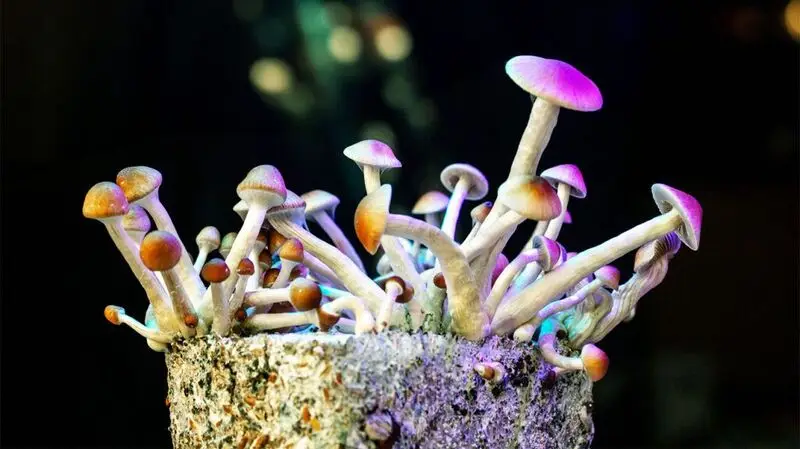
- Irritable bowel syndrome (IBS) is one of the most common conditions affecting the gut.
- Despite its prevalence and decades of research, treatments are limited, and the underlying causes remain shrouded in mystery.
- An ongoing study, conducted by Erin Mauney, MD, is taking a fascinating new approach to this mysterious condition: psychedelics, and more specifically psilocybin.
In this article, we will investigate why researcher Erin Mauney believes psilocybin — the active compound in magic mushrooms — might help treat irritable bowel syndrome (IBS), and how her ongoing research is breaking new ground.
Historically — and, to a certain extent, still today — the mind and body have been considered separate.
As science has progressed, it has become increasingly clear that, of course, the mind is part of the body. There is no separation. The brain is in tight communication with the body at all times via nerves and chemicals, like hormones and neurotransmitters, and the body talks back in the same language.
This two-way interaction is perhaps most pronounced between the brain and the gut. The enteric nervous system (the nervous system of the gut) is the second-largest nervous system in the body after the brain.
Some experts even refer to the gut as our “second brain.” Although the enteric nervous system evolved first, so we could consider it the “
Aside from their shared ancient pedigree, why would the gut and brain share such a tight link? In our modern world, where we are never more than 20 meters from a bagel, it is easy to forget that life on the Savannah millennia ago was much less convenient.
The gut needed to tell the brain when it required refilling with enough time to hunt, scavenge, or forage for its next meal. As the food is ingested, the brain needs to ask the gut to ramp up its operations and prepare to digest.
This relationship helps explain why we can feel longing in the pit of our stomach, and butterflies dance in our intestines when we feel excited: The gut and brain are in cahoots.
Speaking in a recent interview, published in the journal Psychedelics, Mauney explains how, during her gastroenterology training, she “became aware of how common trauma, especially early life trauma, is in the human experience.”
“Although there is more discussion in pediatrics about the cumulative effects of toxic stress over the lifespan,” she continues, “I think overall this is an area that medicine, particularly gastroenterology and obesity medicine, really fails to understand and address meaningfully.”
This piqued her interest in psychological approaches to gut issues.
Indeed, previous research does suggest that
These links have led researchers to believe that IBS has a strong gut-brain component.
Mauney and colleagues are currently embarking on the first-ever study to investigate whether talking therapy in conjunction with psilocybin might help relieve symptoms of IBS.
Speaking in an interview with the Journal of Clinical Gastroenterology (JCG), Mauney explained that around 60% of people with IBS do not respond to first-line therapies, such as dietary interventions or medications.
So, the scientists recruited people with IBS who had already tried a wide range of approaches without experiencing significant benefits. This, she explains, included talking therapies, mind-body therapies, dietary changes, and drugs.
In her JCG interview, Mauney explains how psilocybin acts “transdiagnostically.” In other words, it can alter a range of psychological domains that are common across multiple mental health conditions.
For instance, she explains how the drug can influence psychological characteristics such as:
- Rigidity: An inability to adapt or change.
- Rumination: Dwelling on negative thoughts and feelings.
- Anxious over-focus on the self: A preoccupation with personal matters, while almost forgetting the outside world.
She also says that psychedelics like psilocybin can help some people shift ingrained thought patterns, which is another facet of many mental health conditions, and some people with IBS.
Beyond the psychological aspects of psilocybin treatment, Mauney also has some gut-focused theories.
As the gut digests food, it squeezes, swells, deflates, and so on. For most people, these movements cause no distress or go unnoticed.
For people with IBS, however, these routine movements may cause discomfort or pain. This is called visceral hypersensitivity.
Research in animals suggests that a subtype of serotonin receptors in the gut, called 5HT2a receptors, might
Aside from this link, as Mauney explains in her JCG interview, scientists have also explored whether psilocybin might reduce pain in general. For instance, researchers have examined, with differing results, whether psilocybin could help in the treatment of migraine headaches, chronic neuropathic pain, fibromyalgia, and more.
Because IBS causes visceral pain, this is yet another potential mechanism by which it may impart benefits.
Lastly, there is evidence that psilocybin may have anti-inflammatory effects, which is another important factor associated with IBS.
With its potential to influence psychology, visceral hypersensitivity, pain, and inflammation, psilocybin is a hopeful candidate for the treatment of IBS. Now, we just need to see the data.
Mauney and colleagues’ ongoing study was halfway through enrollment as of her April 24th JCG interview. Although she was cautious not to preempt the findings, Mauney was excited to share that at least some of the participants had experienced benefits.
In the study, participants are paired with two medical professionals with backgrounds in psychotherapy or psychiatry.
Each of the two therapy sessions (two weeks apart) involves the “dosing” part of the study, where the participant takes psilocybin and relaxes while listening to a carefully curated playlist.
Then, the three of them discuss the participants’ symptoms, previous life experiences, and whatever comes up during the session. In total, these sessions last 6–8 hours.
Mauney explains how the psilocybin “acts as an amplifier of therapeutic processes,” perhaps enhancing standard talking therapy.
Although this approach has not worked for everyone in the trial, for some, Mauney says, it has. She explains that it has encouraged some individuals to engage deeply with difficult parts of their lives, make meaningful changes that they could not manage before, or influence close relationships in ways that have led to reduced symptoms.
For others, their symptoms have remained unchanged, but they report that the symptoms are no longer so bothersome.
Medical News Today reached out to Ruvini Wijetilaka, MD, a board certified Internal Medicine Physician at Mecca Health, who was not involved in the study. “As a physician, I find this early research into psilocybin-assisted therapy for treatment-resistant IBS intriguing and encouraging,” she explained.
“IBS is a complex condition rooted in the brain-gut connection,” she continued, “and traditional treatments don’t always work for everyone.”
“In cases where symptoms persist despite initial interventions, psilocybin may offer a promising alternative for targeting the neurological pathways involved. It’s an exciting area of exploration for patients who experience chronic, unrelenting symptoms and have few remaining options.”
— Ruvini Wijetilaka, MD
Mauney’s study is the first to look at this relationship, and the preliminary results are encouraging. However, as she explains, the study is not yet complete, and it might not work.
With that said, because the mechanistic theory is promising, and it seems that at least some people have already benefited, we might be forgiven for being optimistic.
“It might sound a little bit out there to the average gastroenterologist,” says Mauney. “But I think this is really what’s needed, and what our patients are calling out for. […] A holistic approach to their suffering.”
MNT also contacted Prof. David D. Clarke, MD, president of the Association for the Treatment of Neuroplastic Symptoms and board certified in Internal Medicine and Gastroenterology, who is not involved in the research.
“People with IBS that are not responding to available treatments need more options. Under the right conditions, psychedelics are worth a try for this group,” he said.
However, he also suggested comparing its efficacy with Emotional Awareness and Expression Therapy (EAET), which he told us has had some success in the treatment of “people with chronic musculoskeletal pain, back pain (when combined with mindfulness), and long COVID.”
Psilocybin is unlikely to work for everyone, but Mauney hopes that, at least for some, this intervention could improve thought processes and relieve the negative impact of a chronic condition that remains poorly understood.
“While more concrete research is needed on this, the study could mark a meaningful shift in how we approach IBS care and gut health as a whole,” concluded Wijetilaka.





